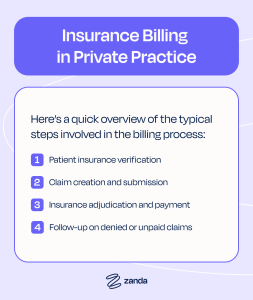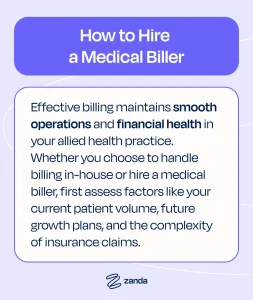You’ve achieved your dream of going into private practice, and perhaps you chose to handle the billing yourself to keep overheads down.
But, between treating patients, managing admin, and chasing payments, running a practice can become overwhelming.
That’s where hiring a medical biller comes in.
What is a medical biller? A medical biller is a professional responsible for submitting and following up on claims to insurance companies. They help ensure that healthcare providers receive appropriate reimbursement for the services they provide to patients.
According to Sermo, health professionals who hire a medical biller report cost savings and more time for their patients as the main benefits of hiring a billing professional.
Whether you decide to hire a professional biller or streamline your existing internal processes, you’ll reduce stress and boost your bottom line if you manage your billing processes effectively.
So, if it’s clear you need help with billing, the next step is to figure out how to hire a medical biller to make the process smoother.
Insurance Billing in Private Practice
Insurance billing in a private practice – especially as a solo practitioner – can be time-consuming and complicated.
Here’s a quick overview of the typical steps involved in the billing process:
- Patient Insurance Verification: Before any treatment, it’s standard to verify a patient’s insurance coverage to ensure that services are covered. Understanding the details of co-pays, deductibles, and potential out-of-pocket costs is helpful in this regard.
- Claim Creation and Submission: After health services are rendered, insurance claims need to be submitted. This includes familiarizing yourself with and providing the appropriate medical codes and ensuring the accuracy of information.
- Insurance Adjudication and Payment: The insurance company reviews the claim to determine whether it meets the policy’s requirements for reimbursement. If approved, payment is sent to the practice, and the patient is billed for any remaining balance.
- Follow-up on Denied or Unpaid Claims: Not all claims are approved on the first submission. The practice is responsible for following up on denied or unpaid claims, addressing any errors, and resubmitting them for payment. This can be tedious, but it’s essential to ensuring the practice gets paid.
Taken together, these steps can be time-consuming and prone to error. If you decide to hire an insurance biller, you might find that you’re able to save time in the long run.
Step 1: Understand Your Billing Needs
Before you decide whether to hire a medical biller, assess your current billing situation and plan for the future.
Look at:
- Current Billing Volume: Take stock of how many insurance claims you submit each week or month. Are you able to keep up, or do you have a backlog of claims?
- Time Invested in Billing: Keep a log over a two-week period and tally how many hours you spend on billing activities. This is unpaid work. How many billable client hours are you losing as a result of billing administration?
- Future Growth: If you plan to expand your practice or bring in more patients, your billing needs will increase. Think about where your practice is headed and whether you’ll need additional support to manage the growth effectively.
- In-House vs. Outsourced Billing: Decide whether it makes more sense to keep billing in-house or outsource it to a professional medical biller. In-house might give you more control, but outsourcing may save you money and administrative time.
Important Challenges and Considerations
For solo practitioners or small practices, the insurance-claiming process can quickly become a hurdle. Unlike larger practices with dedicated billing departments, solo practitioners often have to wear many hats, and keeping up with medical billing can feel overwhelming.
Here are some common issues to keep in mind:
- Time-Consuming: Billing, especially the follow-up on denied insurance claims, can eat into time that could otherwise be spent with patients or focusing on other aspects of the business.
- Complexity of Insurance Requirements: Insurance companies have different policies, coding rules, and timelines, which can make it difficult to keep track of everything. Even small errors can lead to denied claims or delayed payments.
- Cash Flow Management: Without a dedicated billing professional, it can be difficult to maintain consistent cash flow. Denied or delayed claims can create financial instability, impacting the overall health of the practice.
- Regulatory Compliance: Staying compliant with healthcare regulations and billing standards is critical to avoiding fines or audits, but it adds another layer of complexity for solo practitioners.
- Discomfort in Dual-Relationships with Patients: Many healthcare practitioners tend to enjoy clinical work with patients, but are uncomfortable with the billing and administrative side of the business. When billing problems arise, it means practitioners have to respond as a solo business owner, not as a practitioner. This can create complications in the practitioner-patient relationship and may also lead to avoidance by the practitioner.
For many, hiring a medical biller to handle these tasks can provide peace of mind.
Step 2: Understand What Medical Billers Offer
Medical billers take on a variety of crucial tasks that help ensure your practice’s finances stay organized and efficient. From navigating the complexities of insurance claims to managing patient payments, their role is all about making sure the billing process runs like clockwork.
Here are a few of their key responsibilities:
- Claim Preparation and Submission: Medical billers prepare and submit insurance claims on behalf of your practice, ensuring that all information is accurate and complete to avoid payment delays.
- Insurance Follow-Up and Appeals: They track submitted claims, follow up on unpaid or rejected claims, and handle any necessary appeals to ensure your practice gets the reimbursement it’s owed.
- Patient Billing and Collections: Billers also manage patient invoices, send reminders for outstanding balances, and handle collections if necessary, helping you maintain a steady cash flow. It also creates a clear boundary between you and your patients as the biller deals with payments and insurers, leaving you to focus on the clinical work.
- Coding and Compliance: A critical part of medical billing involves staying abreast of the latest coding regulations and compliance standards. A professional biller ensures that all claims meet these requirements, reducing the risk of errors or audits.
Benefits of Hiring a Medical Biller
Outsourcing your billing can improve both the financial health and day-to-day operations of your practice.
Here are some of the benefits of hiring a medical biller:
- Time and Potential Cost Savings: Hiring a biller frees up your time to focus on patient care while potentially saving you money by reducing billing errors and speeding up payments.
- Increased Accuracy and Efficiency: Professional billers specialize in submitting accurate claims, minimizing costly mistakes, and reducing claim rejections.
- Improved Cash Flow: With a dedicated professional handling your billing, payments may come in more consistently, keeping your practice’s finances on track.
- Compliance with Regulations: Medical billers stay up-to-date with ever-changing healthcare regulations, help to ensure your practice remains compliant and avoid legal pitfalls.
Step 3: Know What to Look for When Hiring a Medical Biller
Before hiring a medical biller, consider a few key factors to ensure they’re the right fit for your practice:
Experience and Qualifications
Not all medical billers are the same, so it’s crucial to find someone who understands the unique needs of your profession – do your due diligence. Whether you’re a mental health therapist, physical therapist, or speech therapist, ask about their experience with billing in your specific field. Look for relevant certifications or qualifications that demonstrate their expertise in medical billing.
Software Proficiency
Every practice uses different systems and software, so your medical biller must be familiar with your practice management and billing software. Make sure they have the skills to navigate your systems efficiently. This will save time and reduce the learning curve.
Communication and Collaboration
Medical billing requires ongoing communication with insurance companies, patients, and your practice. Your biller should be responsive and able to collaborate effectively with you and your team, ensuring that everyone stays on the same page. Effective communication skills are key to resolving any issues that might come up during the billing process.
Fees and Contracts
Billers charge in different ways – some might charge a flat fee, while others take a percentage of collections. Make sure you understand the fee structure and any contracts before making a decision. Also, discuss any additional costs, such as for follow-up on denied claims or the use of specific billing software, to avoid surprises down the line.
Step 4: Explore How to Find a Medical Biller
Once you’ve decided to hire a medical biller, the next step is knowing where to look.
Here are some effective ways to find the right candidate. By leveraging these resources, you’re more likely to find a medical biller who understands the nuances of your field and can seamlessly integrate into your practice.
Networking
Start by tapping into your existing professional network. Reach out to other healthcare professionals, particularly those in similar fields like mental health or physical therapy, and ask for their recommendations. Many practitioners find great billers through word-of-mouth referrals, so don’t hesitate to ask around at industry events, local meetups, or even online forums.
Professional Organizations
Allied health professional organizations may offer resources for finding reputable medical billers. Associations like the American Mental Health Counsellors Association (AMHCA) or the American Physical Therapy Association (APTA) often have referral services or member directories that can help you connect with qualified billing professionals who are familiar with the needs of your specific practice.
Step 5: How to Work with a Medical Biller: EHR Access
Once you’ve hired a medical biller, you’ll need to ensure they have appropriate access to your electronic health records (EHR) software for a smooth and secure collaboration.
Here’s what you need to consider:
- Data-Sharing: Your medical biller will need access to certain patient information to submit claims and manage billing tasks. It’s important to establish appropriate access with the correct user permissions, ensuring that all patient information is protected and complies with privacy regulations like HIPAA. Use platforms designed to store healthcare data securely.
- Access Permissions: When granting your medical biller access to your EHR, it’s crucial to set the appropriate permissions to maintain both security and privacy. Systems like Zanda offer an administrative access level, allowing you to control what the biller can see and do within the system. Make sure they only have access to the data necessary for billing, minimizing the risk of unauthorized access to sensitive patient information.
- Training and Support: Even experienced medical billers may need some orientation when it comes to your specific EHR system. Provide them with adequate training and ongoing support to ensure they can efficiently navigate the system and perform their tasks without hiccups. This upfront investment in training can prevent mistakes and streamline your billing process in the long run.
Effective medical billing helps maintain smooth operations and financial health in your allied health practice. Whether you choose to handle billing in-house or hire a medical biller who works with your practice management software, first assess factors like your current patient volume, future growth plans, and the complexity of insurance claims. Medical billers handle a wide range of tasks, from claim preparation to following up on denials; outsourcing these responsibilities can free up valuable time, reduce errors, and improve cash flow.
Take the time to find a reputable biller who understands your field and can work effectively within your practice to support its long-term success.
No matter how you decide to manage billing, don’t let software slow you down. Start your 14-day free trial with Zanda now!







